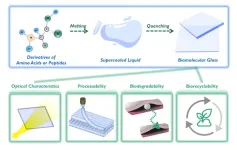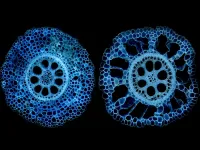(Press-News.org) New Haven, Conn. — The microbes that inhabit the gut are critical for human health, and understanding the factors that encourage the growth of beneficial bacterial species — known as “good” bacteria — in the gut may enable medical interventions that promote gut and overall human health. In a new study, Yale researchers have uncovered a novel mechanism by which these bacteria colonize the gut.
Specifically, the Yale team discovered that one of the most abundant beneficial species found in the human gut showed an increase in colonization potential when experiencing carbon limitation — a finding that could yield novel clinical interventions to support a healthy gut. The findings were published March 16 in Science.
The Yale team, based in the lab of geneticist Eduardo Groisman, the Waldemar Von Zedtwitz Professor of Microbial Pathogenesis, found that the beneficial gut bacterium Bacteroides thetaiotaomicron responded to starvation for carbon — a main building block for all cells — by sequestering a portion of the molecules for an essential transcription factor within a membrane-less compartment.
The team established that sequestration of the transcription factor increased its activity, which modified the expression of hundreds of bacterial genes, including several that promote gut colonization and control central metabolic pathways in the bacterium. These findings reveal that “good” bacteria use sequestration of molecules into membrane-less compartments as a vital strategy to colonize the mammalian gut.
Bacteroides thetaiotaomicron and other bacteria residing in the mammalian gut have access to nutrients ingested by the host animal. However, there are also long periods of time when the host organism does not eat. Deprivation of nutrients, including carbon, elicits the production of colonization factors in beneficial gut bacteria, the researchers found.
“One of the things that emerged is that when an organism is starved for carbon, that is the signal that helps produce properties that are good for surviving in the gut,” said Aimilia Krypotou, a postdoctoral fellow in Groisman’s lab and lead author of the study.
A confluence of observations from the lab’s previous research led to the breakthrough. The first was when Groisman noticed that the size of the transcription factor from the gut microbe was much larger than those of other well-studied homologous proteins from other bacterial species. The team then found that bacteria could not survive in the gut of a mouse without the extra region absent from homologous proteins.
Krypotou then hypothesized that the extra region might confer a new biophysical property to the transcription factor required for the bacteria to survive in the gut, and successfully performed a series of experiments to test the hypothesis.
An awareness of these membrane-less compartments actually goes back a hundred years, Groisman said. Krypotou’s key insight, he said, was to deduce novel properties for the bacterial transcription factor — termed Rho — based on the extra region. Sequestration of the transcription factor takes place by a process known as liquid-liquid phase separation, a ubiquitous phenomenon present in a wide variety of cells including those of humans.
“This phenomenon has been known but is usually associated with stress in eukaryotic organisms, such as plants, animals, and fungi,” said Groisman. “Recently it was realized it can also happen with bacteria and, in our case, we established that it occurs in commensal gut bacteria, which require it for survival in the gut. One could conceivably, potentially imagine that if one were to manipulate organisms prone to this effect, perhaps one could improve organisms beneficial to humans.”
The findings could help spur the development of new probiotic therapies for gut health, Krypotou said.
“Most studies just look at abundance of bacterium,” she said. “If we don’t understand what’s happening at the molecular level, we don’t know if it would help.”
Other authors include Guy Townsend III and Xiaohui Gao, former postdoctoral fellows; Nick Pokorzynski, current postdoctoral fellow in Groisman’s lab; Jun Liu and Shoichi Tachiyama, postdoctoral fellow in Liu’s lab, and Andrew Goodman from Yale Microbial Sciences Institute.
END
Boosting survival of a beneficial bacterium in the human gut
2023-03-17
ELSE PRESS RELEASES FROM THIS DATE:
International Society for Autism Research (INSAR) 22nd Annual Meeting to be held in Stockholm, Sweden May 3- 6, 2023
2023-03-17
The International Society for Autism Research (INSAR) will hold its 2023 Annual Meeting – the organization’s 22nd – from Wednesday, May 3 through Saturday, May 6, 2023, bringing together a global, multidisciplinary group of hundreds of autism researchers, clinicians, advocates, self-advocates, and students to exchange the latest scientific learnings and discoveries that are advancing the expanding understanding of autism and its complexities. This year’s meeting will be held in-person in Stockholm, Sweden at Stockholmsmässan, the largest exhibition facility in the Nordic region.
The INSAR ...
Genomic study of ancient humans sheds light on human evolution on the Tibetan Plateau
2023-03-17
The Tibetan Plateau, the highest and largest plateau above sea level, is one of the harshest environments settled by humans. It has a cold and arid environment and its elevation often surpasses 4000 meters above sea level (masl). The plateau covers a wide expanse of Asia—approximately 2.5 million square kilometers—and is home to over 7 million people, primarily belonging to the Tibetan and Sherpa ethnic groups.
However, our understanding of their origins and history on the plateau is patchy. Despite a rich archaeological context spanning the plateau, ...
Key role identified for nervous system in severe allergic shock
2023-03-17
DURHAM, N.C. – A key feature of the severe allergic reaction known as anaphylaxis is an abrupt drop in blood pressure and body temperature, causing people to faint and, if untreated, potentially die.
That response has long been attributed to a sudden dilation and leakage of blood vessels. But in a study using mice, Duke Health researchers have found that this response, especially body temperature drop, requires an additional mechanism – the nervous system.
Appearing online March 17 in the journal Science Immunology, the study could ...
Researchers develop biodegradable, biorecyclable glass
2023-03-17
Everyone is familiar with glass—from putting on eyeglasses, pushing open the window, standing in front of a mirror, to holding a water glass. Glass is ubiquitous in nature and essential to human life.
But the widespread use of persistent, non-biodegradable glass that cannot be naturally eliminated causes long-term environmental hazards and social burdens.
To solve this problem, a research group led by Prof. YAN Xuehai from the Institute of Process Engineering (IPE) of the Chinese Academy of Sciences has developed a family of eco-friendly glass of biological origin fabricated from biologically derived amino acids or peptides. The ...
Qubits put new spin on magnetism: Boosting applications of quantum computers
2023-03-17
LOS ALAMOS, N.M., March 17, 2023 — Research using a quantum computer as the physical platform for quantum experiments has found a way to design and characterize tailor-made magnetic objects using quantum bits, or qubits. That opens up a new approach to develop new materials and robust quantum computing.
“With the help of a quantum annealer, we demonstrated a new way to pattern magnetic states,” said Alejandro Lopez-Bezanilla, a virtual experimentalist in the Theoretical Division at Los Alamos National Laboratory. ...
New combination of drugs works together to reduce lung tumors in mice
2023-03-17
LA JOLLA—(March 17, 2023) Cancer treatments have long been moving toward personalization—finding the right drugs that work for a patient’s unique tumor, based on specific genetic and molecular patterns. Many of these targeted therapies are highly effective, but aren’t available for all cancers, including non-small cell lung cancers (NSCLCs) that have an LKB1 genetic mutation. A new study led by Salk Institute Professor Reuben Shaw and former postdoctoral fellow Lillian Eichner, now an assistant professor ...
Biomarkers show promise for identifying early risk of pancreatic cancer
2023-03-17
DURHAM, N.C. – A research team at Duke Health has identified a set of biomarkers that could help distinguish whether cysts on the pancreas are likely to develop into cancer or remain benign.
Appearing online March 17 in the journal Science Advances, the finding marks an important first step toward a clinical approach for classifying lesions on the pancreas that are at highest risk of becoming cancerous, potentially enabling their removal before they begin to spread.
If successful, the biomarker-based approach could address the biggest impediment to decreasing the ...
Discovery of root anatomy gene may lead to breeding more resilient corn crops
2023-03-17
UNIVERSITY PARK, Pa. — A new discovery, reported in a global study that encompassed more than a decade of research, could lead to the breeding of corn crops that can withstand drought and low-nitrogen soil conditions and ultimately ease global food insecurity, according to a Penn State-led team of international researchers.
In findings published March 16 in the Proceedings of the National Academy of Science, the researchers identified a gene encoding a transcription factor – a protein useful for converting DNA into RNA – that triggers a genetic sequence responsible for the development of an important trait enabling corn roots ...
New study shows social media content opens new frontiers for sustainability science researchers
2023-03-17
With more than half of the world’s population active on social media networks, user-generated data has proved to be fertile ground for social scientists who study attitudes about the environment and sustainability.
But several challenges threaten the success of what's known as social media data science. The primary concern, according to a new study from an international research team, is limited access to data resulting from restrictive terms of service, shutdown of platforms, data manipulation, censorship and regulations.
The study, published online March ...
East and West Germans show preference for different government systems 30 years on
2023-03-17
Even after 27 years of reunification, East Germans are still more likely to be pro-state support than their Western counterparts, a new study published in the De Gruyter journal German Economic Review finds. Of the sample studied, 48% of respondents from the East said it was the government’s duty to support the family compared to 35% from the West.
The study led by Prof. Nicola Fuchs-Schündeln of Goethe University Frankfurt, Germany builds on her earlier work which evaluated results from the German Socio-Economic Panel, a regular survey of around 15,000 households. The survey has been running in the federal ...




